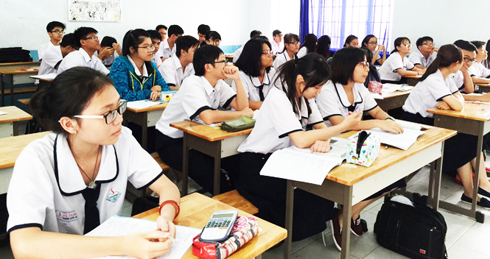On August 26, 2020, the Minister of Education and Training of Vietnam issued Circular 26/2020/TT-BGDDT on the amendment of the Regulation on the evaluation and grading of lower secondary and upper secondary school students in Vietnam, attached to Circular 58/2011/TT-BGDDT. In which, the evaluation and grading criteria for secondary school students have undergone significant changes.

Important Changes in the Criteria for Evaluating and Grading Secondary School Students in Vietnam (illustrative image)
1. Only two types of tests and assessments for secondary school students in Vietnam
As stipulated in Clause 3, Article 1 of Circular 26/2020/TT-BGDDT, which amends Clause 2, Article 7 of Circular 58/2011/TT-BGDDT, there are now only two types of tests and assessments for secondary school students:
- Regular assessment:
Regular assessment is conducted during the teaching and educational process to evaluate the process and results of students' learning and training tasks according to the subjects and educational activities in the General Education Program issued by the Minister of Education and Training.
- Periodic assessment:
Periodic assessment is conducted after each educational phase to evaluate learning outcomes, training, and the level of completion of learning tasks according to the subjects and educational activities stipulated in the General Education Program issued by the Minister of Education and Training.
Thus, instead of various forms of tests like oral tests, 15-minute tests, one-period tests, or semester tests as in the past, secondary school students will now have only two types of tests: regular assessments and periodic assessments. Regular assessments will function like oral tests and 15-minute tests; periodic assessments will function like one-period tests and semester tests.
2. Diverse forms of assessments for secondary school students in Vietnam beyond written exams
- Regular assessment is conducted either directly or online through various forms such as: Q&A, writing, presentations, practical work, experiments, and learning products.
- Periodic assessment, which includes mid-term and end-term evaluations, is conducted through various forms such as: tests (on paper or computer), practical exercises, and learning projects.
Commentary:
- The diversification of assessment forms aligns with the current educational innovation trend, helping to more accurately evaluate students' capabilities. This change addresses the limitations of traditional written exams, which only assess a portion of students' abilities.
- Additionally, incorporating practical assessments helps students apply theoretical knowledge, enhancing the learning process from mere knowing to understanding and application, adhering to the modern education principle of "learning by doing."
- Moreover, adopting multiple forms of assessments beyond written exams reduces the grading burden on secondary school teachers.
- The choice of assessment methods will be decided by the teacher based on the subject's nature, providing flexibility for both student learning and teaching activities.
3. Adding foreign languages alongside Mathematics and Literature as one of the three subjects needing a score above 8.0 for classification as excellent students
As stipulated in Clause 6, Article 2 of Circular 26/2020/TT-BGDDT, which amends Clause 1, Article 13 of Circular 58/2011/TT-BGDDT as follows:
Secondary students will be classified as excellent if they meet the following criteria:
- The average score of all subjects must be 8.0 or higher, including at least one of the subjects: Mathematics, Literature, or Foreign Language, with an average score of 8.0 or higher; for specialized class students, the specialized subject must have an average score of 8.0 or higher;
- No subject has an average score below 6.5;
- Subjects assessed by comments must achieve a classification of D.
Thus, from October 11, 2020, Foreign Language will officially be included in the set of one of the three subjects needing a score above 8.0 to be classified as excellent for secondary school students.
Thuy Tram
- Key word:
- secondary school
- Secondary School Student
- Vietnam
 Article table of contents
Article table of contents










.Medium.png)
.Medium.png)
.Medium.png)
.Medium.png)
